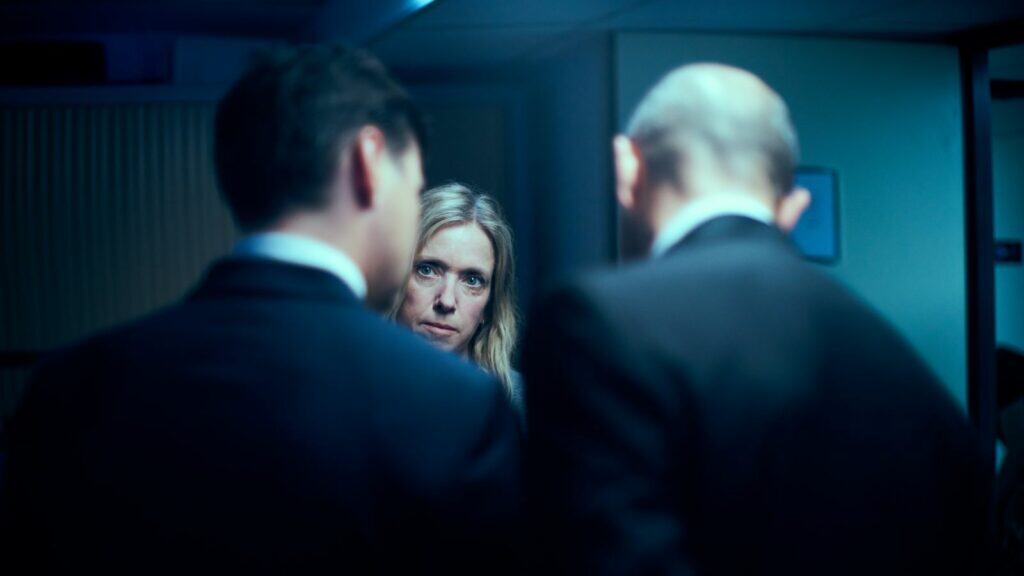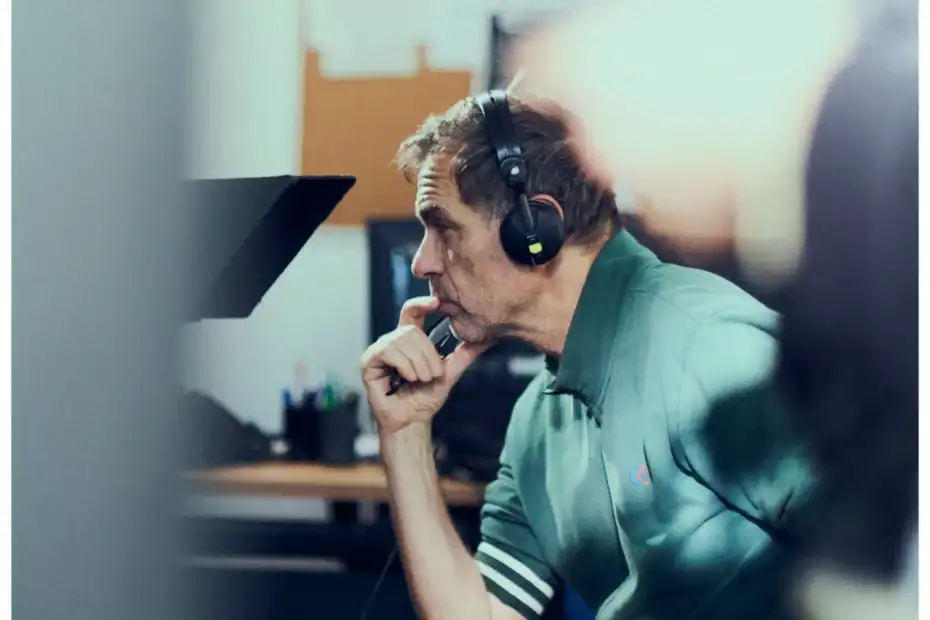I watched Dominik Moll’s Dossier 137 (reviewed here) in this year’s Cannes Film Festival competition. I had the opportunity to talk to the director after the screening. The film depicts an IGPN (Internal Affairs) investigator handling cases of possible police misconduct.
Is it possible to identify with the police officers while doing research?
Dominik Moll: Yes, in a way, not with police officers who have a problem with violence, who should not be in the police, and there are quite a few of them. On the other hand, those who do crowd control during demonstrations are put in a complicated situation.
There are so many funny details in this film which surprised me. They keep repeating that they got stuff from Decathlon. Does it come from your research?
DM: Yes, it does. This is why it was so important for me to be able to spend a few days with the IGPN because
otherwise, I wouldn’t have done the film. That was one of the things an investigator told me. The BRI guys are really tough cops, but they are not used to crowd control like this. They shouldn’t have done it, but they had to during two weekends in 2019. They were asked at the last minute, and the equipment they had was not fit for crowd control, so they had to go to Decathlon.
The Disapproving Swede: Just a follow-up on the Decathlon thing. I guess that also shows the lack of resources the police have.
DM: Yes and no. Because they are really over-equipped, I think, in France, when it comes to weapons. They are militarized, and they become worse and worse in that regard. When you look at them, they really look like Robocops, which also dehumanizes them, and they’re heavily armed. Those riot guns are really dangerous.

Was the basic idea of the film the police investigating the police or the Yellow Vests protests?
DM: It was both because I knew I was interested in internal affairs, but when it concerns demonstrations, it has to do with our society and democracy. The few days I spent at IGPN confirmed my intuition that they had no problem working on corruption cases, as they stated that those who dishonour the police must be punished. On the other hand, they felt that those police officers who have to do crowd control are put into difficult situations. However, when something happens, people often point the finger at them instead of their superiors, so they identify more with those police officers.
This is also interesting, you know, the whole question of bias: what does bias mean? And then, with Gilles Marchand, my fellow screenwriter, we felt, “Okay, if we turn things around and if our police investigator has another kind of bias, and she comes from the same town as the demonstrator.” This was something that I also found interesting about the yellow vests movements: many of the people demonstrating were of the same social origin as many police officers, and with that, something changed in her point of view. Many of the demonstrators believed that the police would accompany them and didn’t understand why they were stopped from meeting Macron, for instance.
Dominik Moll on Gilles Marchand
TDS: You mentioned Gilles Marchand. You’ve worked together for more than 20 years now. I wonder how the process has changed over the years, not least regarding Dossier 137, which is impressively well-balanced in its scenario. How has it changed over the years, and how did you specifically work on this film?
DM: We’ve known each other for 40 years now. We met at film school, and we’ve always worked together also on the screenplays of his films.

TDS: But not on the first one, right? Qui a tué Bambi?
DM: Yes, on that one as well, but my name was not in the credits. It’s both a collaboration and a friendship, and we know each other by heart. I think what changed is that we are a bit more efficient. We are not afraid to throw out ideas that don’t work. However, it’s true that in the last two films, The Night of the 12th and this one, a very important aspect was the extensive research and documentation that I had done beforehand. On this film, I did more than four months of research, reading investigations and meeting lawyers, victims, magistrates and journalists who worked on different cases.
I visited the IGPN and then maintained contact with some of the investigators. From the beginning, it was clear that the narrative would be told from the point of view of an investigator, which we thought was a good way to gain a nuanced and balanced view of the situation. Because, of course, if we had told the whole story from the point of view of the victim, which could also be possible, it would have been different. There would probably be more immediate empathy for the victim. As it stands, the victim is mainly off-screen, and all we know about them or their family is what we see through Stephanie’s eyes.
TDS: Certain aspects of the writing made me think of Tavernier’s L.627 (1992). Perhaps that is the reason the police officers’ resources came to mind.
DM: Yes, and that was one of the first films that told a film from the policemen’s point of view.
TDS: The co-scenarist, Michel Alexandre, was a police investigator if I’m not mistaken.
DM: Yes, he was.
Léa Drucker plays the protagonist. Was she your first choice?
DM: Yes, it was my first choice. I mean, I’ve never written a part for an actor or actress and didn’t tell myself it was going to be her. But during the writing process, I thought of her more and more. I worked with Léa 10 years ago in a film called News from Planet Mars, but she had a small part…
TDS: …and only on a screen.
DM: Yes, she was playing a TV reporter. We got along really well. Since then, I’ve followed her career and seen films in which she delivered great performances. As I was writing, she would kind of always pop up, and I even heard some of the dialogue in her voice. When the first draft of the screenplay was done, I called her, and we met. She read the script and right away said that she wanted to do it, and it was great to work with her.
Dominik Moll
An interview with Dominik Moll about his latest film Dossier 137. The film premiered at this year's Cannes competition. #Cannes2025 #FilmTwitter
Job Title: Film Director

